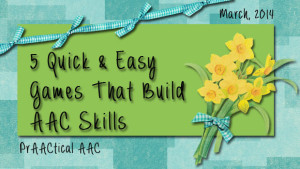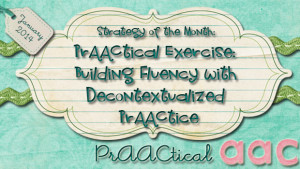March 27, 2014
by Carole Zangari -

Have a few minutes and want to get in some core word prAACtice without making it seem like work? Giving the AAC learner a chance to boss us around and direct us do things just because they tell us to is something that has worked for us more times that we can count. Put the AAC learner in control and make it fun. Get your silly on and ham it up but remember to use aided language input throughout the process. Here are some ideas. They say: “Go,” “Sit,” “Tell,” or “Walk.” We act that out in the craziest way possible. They say: “Happy,” “You happy,” “Sad,” or “You sad.” We make the most ridiculous happy/sad faces imaginable. They say: “What,” “What is it?” or “What is that?” We use the context to figure out what they’re referring to and say “It is a ___.” They say: “Get the ____,”... [Read More...]
Filed under: PrAACtical Thinking
Tagged With: core vocabulary, fluency, fun, games, practice
January 20, 2014
by Carole Zangari -

In most situations, communication teaching must be steeped in a meaningful context. SLPs build their plans for teaching new concepts or communicative intents around things that are relevant and important to the AAC learner. How do you teach ‘more’ without something the learner wants more of? How do you teach ‘fast’ without making something zip around? It just wouldn’t work. We get the role of context and have written many posts emphasizing the central part it must play in AAC intervention. Is there are prAACtical place for therapy activities that are NOT embedded in a rich semantic context? We think so. First, a word about what we mean when we talk about therapy activities that are decontextualized. We’re talking about activities in which there is not necessarily a connection between the semantics and the outcome for the AAC learner. (For example, saying a sentence with ‘more’ in it, does NOT... [Read More...]
Filed under: Strategy of the Month
Tagged With: All Turn It, context, fluency, Opportunities, Picture WordPower, practice, Speech Room News, Toca Boca

